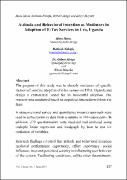Attitude and behavioral intention as mediators in adoption of E-tax services in ura, Uganda

View/
Date
2016Author
Moya, Musa
Nabafu, Robinah
Maiga, Gilbert
Mayoka Kituyi, Geoffrey
Metadata
Show full item recordAbstract
The purpose of this study was to identify mediators of specific
factors influencing adoption of e-tax system on URA, Uganda and
design a customized model for its successful adoption. The
research was conducted based on empirical data collected from the
field.
A cross-sectional survey and quantitative research approach were
used to collect primary data from a sample of 350 respondents. In
addition, 279 questionnaires were received and analyzed using
multiple linear regression and medgraph by Jose to test for
mediation of variables.
Research findings revealed that attitude and behavioral intention
mediated performance expectancy, effort expectancy, social
influence, trust and perceived security in influencing user behavior
of the system. Facilitating conditions, unlike other determinantsdirectly influence on user behavior. Trust, perceived security and
attitude are new constructs that were included in the model.
This research will help the government to discover specific factors
that influence Ugandans to adopt e-government systems.
Discovery of specific factors will help the government to come up
with a practical and long lasting solution to adoption barriers.
Originality of the study came as a result of identifying Uganda
based factors affecting e-government adoption. It was achieved
through listing a number of adoption factors by respondents based
on choice of specific factors that influence on e-government
adoption in Uganda. Therefore, selected factors were based on
design of customized UTAUT model for adoption of e-government
systems in Uganda.
